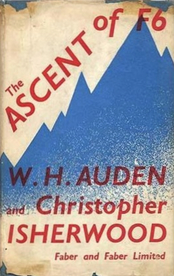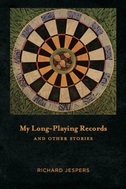A WRITER'S WIT |
I'VE MADE IT MY GOAL to read the entire oeuvre of late British-American author, Christopher Isherwood, over a twelve-month period. This profile constitutes the sixth in a series of twenty.
My Book World

After having taken in so much of Isherwood’s material, I feel strange reading a collaboration between him and Auden. Whose idea belongs to whom? Where do the words of one author pick up and words of another leave off? The allegory seeming somewhat dated, would anyone produce it today?
The main character, Michael Ransom, succumbs to his mother's persuasion and his brother James’s urging, and leads an expedition up F6, a mountain peak on the border between Britain and a fictitious nation of Ostnia. Some of his men die on the trip, and he himself perishes at the end. In interspersed scenes, a sort of Greek chorus—Mr. A and Mrs. A speaking in rhyme—comment on his expedition and contrast it with their mundane lives. If I have to guess, I would suggest that Isherwood models Mrs. Ransom after his mother (a domineering woman, we learn from his Diaries), and Auden is responsible for the lines the chorus recites. Benjamin Britten, friend to both men, writes music for the play.
Some passages worth noting:
“James [Ransom]: Merely that the mountain is said to be haunted by a guardian demon. For this reason, no native will set foot upon it. As you will notice, it stands exactly on the frontier line. Both Ostnia and ourselves claim it; but, up to the present, no European has ever visited the district at all . . . [t]he natives have begun telling each other that the white man who first reaches the summit of F6, will be lord over both the Sudolands, with his descendants, for a thousand years” (25-6).
“Announcer: There are many legends about this mountain and the troll who lives on the summit and devours all human beings who dare approach it. No Europeans have, so far, ventured into this region, which is barren to a degree and inhabited only by monks who resent foreigners” (31).
“Mr. A and Mrs. A.: Why were we born?
James [Ransom]: That’s a very interesting question, and I’m not sure I can answer it myself. But I know what my brother, the climber, thinks. When we take, he said to me once, the life of the individual, with its tiny circumscribed area in space and time, and measure it against the geological epochs, the gigantic movements of history and the immensity of the universe, we are forced, I think, to the conclusion that, taking the large view, the life of the individual has no real existence or importance apart from the great whole: that he is here indeed but to serve for his brief moment his community, his race, his planet, his universe; and then, passing on the torch of life undiminished to others, his little task accomplished, to die and be forgotten” (115).

Introduction to My Long-Playing Records
"My Long-Playing Records" — The Story
"A Certain Kind of Mischief"
"Ghost Riders"
"The Best Mud"
"Handy to Some"
"Blight"
"A Gambler's Debt"
"Tales of the Millerettes"
"Men at Sea"
"Basketball Is Not a Drug"
"Engineer"
"Snarked"
"Killing Lorenzo"
"The Age I Am Now"
"Bathed in Pink"
Listen to My Long-Playing Records Podcasts:
"A Certain Kind of Mischief"
"The Best Mud"
"Handy to Some"
"Tales of the Millerettes"
"Men at Sea"
"My Long-Playing Records"
"Basketball Is Not a Drug"
"Snarked"
"Killing Lorenzo"
"Bathed in Pink"
Also available on iTunes.


 RSS Feed
RSS Feed